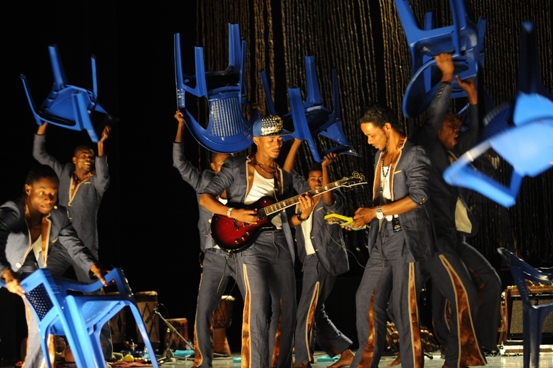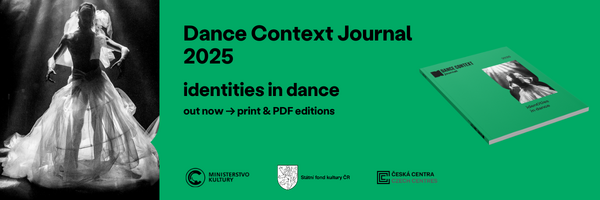Fatal encounter of Alain Platel, Serge Kakudji and Fabrizio Cassol

One of the highlights of this year's Tanec Praha festival is Coup Fatal, a show that uniquely combines European baroque arias and African music. This project put together countertenor Serge Kakudji, conductor and guitar player Rodriguez Vangama, composer Fabrizio Cassol and choreographer Alain Platel. Fourteen musicians from the Congo play traditional instruments and electric guitars, sing, dance and above all they generate incredible energy. The premiere of the project took place on June 10, 2014 in Vienna's Burgtheater within the Wiener Festwochen festival. Immediately after the premiere, we talked with the three creators of this new work about their inspiration and life in the Congo.
What does Coup Fatal mean and why did you give this piece such name?
Serge Kakudji: Coup Fatal is not only the name of the project, but also the name of the group of musicians who perform in the show. Musicians originally come from different bands, so a new ensemble has been created for this piece.
When we were looking for a name, we came up with different connections with "coup" (in English: a blow), for example here, my daddy (I call Alain "daddy") proposed "coup de grace". "Coup fatal" is a French term that denotes big blow that knocks you down, or a fatal blow to the consequences of which we can die. The name is also related to the combination of Baroque and African music, because you really need to dare to try to combine them. So we dared, me and my parents here (I call Fabrizio "mom"), and sometimes when we were listening to what comes from that connection, we thought that it would have probably fatal consequences for us.
How did you come up with the idea of joining Baroque and African music?
S.K.: In the beginning it was supposed to be only a concert of Baroque music. But there is no Baroque orchestra in Kinshasa, so we had to find another solution. It was conceived during the Connection Kinshasa festival, organized by the Brussels theater KVS (Royal Flemish Theatre). It is very active in Congo; it presents talented people and helps them. They approached me to do a concert of Baroque music and I realized that I would not get a Baroque orchestra in Kinshasa. So I had the idea to try it with a traditional orchestra.
Serge, how did you meet with opera music? Who discovered your vocal disposition, which is so rare?
S.K.: I once saw an opera performance on TV and I was absolutely amazed. Although I did not understand the words, I felt that I understood everything. It was a fateful meeting. I started as an autodidact, I sang in a church choir.
I have not stopped singing with a child voice (falsetto), even when I began to mutate, some say it was caused by the strength of my voice. But I do not know how it works, maybe it is simply a gift.
Then while working on one project I met American singer Laura Claycomb, who is like my musical mother. Laura began to give me the first real singing lessons, thanks to her I began to work on my technique, gestures and expression. Then I got an offer to study in Belgium and I said "yes".
For you, Alain, it could also have been a fatal blow and somehow a risk, to participate in this project...
Alain Platel: Well, I actually jumped into it quite late. They began with this project already four years ago, in 2010. Fabrizio was first invited to musical collaboration, and because me and Serge, we already worked on my piece Pitié!, they called me to come look at it. My job was to deliver more theatrical form to the work.
S.K. It was actually him who gave the „fatal blow“. (laughing) The energy of all the Congolese musicians and dancers needed to be streamlined.
Why didn’t you engage any of the dancers from your company Les Ballets C de la B?
A. P.: That might be the next step. (laughing) I did not want to combine it, because originally it was a concert. And I was more interested to reveal all the things that were already there than to put dancers next to them.
S. K.: Yes, everything comes mainly from us. In the Congo all musicians also dance. Actually all Congolese people dance. When we hear music, it wakes a lot of energy in us and it is necessary to streamline that energy.
And how did you get in this project, Fabrizio?
Fabrizio Cassol: KVS invited me to Congo previously, independently of this project. I wasn’t working with them yet at the time of the first concert, but I heard it. Later I joined them, I was in the Congo five or six times when we worked together intensively. It grew all the time and the union was becoming more and more interesting. After completion of each part, we held a small concert for friends and colleagues. Interestingly, when we were rehearsing, musicians were usually sitting, but once we played in front of people, they began to raise and move very impulsively. Then Alain came and released all the energy.
Alain, how did you prepare for this work and how did you define your role before you started? You probably had to expect a completely different energy ...
A.P.: In the beginning I was hesitant, I was not sure if I would be able to enter the process at all, because originally it was a concert. And then when I arrived, I found that I just wanted to be with them! (laughing) I bade them not to hesitate to express themselves and move during the concert. I just wanted to organize things that I saw already happening.
Mainly I did not want it to be a dance performance. I came up with three proposals: the scene with decorative curtains by Congolese artist Freddy Tsimbu who creates sculptures out of empty cartridges collected in the war zone; I asked him to use for the set design the blue chairs, on which the musicians were sitting, when I first saw them. I was also inspired by Congolese sapeurs, their behaviour and movement (the expression sapeur could be translated as dandy, ed. note).
Did you know this phenomenon before visiting the Congo? Could you describe it?
A. P.: I didn’t know it until there. Initially I thought it was just one movement, but then I found out that there are many different kinds of sapeurs. Some deal only with fashion, others have even political connotations.
This movement has already started in the twenties of the last century, it was a reaction of the Congolese to the colonizers: they imitated them, dressed like them, and showed that they can do it even better. And it lasts until now.
Are sapeurs also among the musicians who perform in Coup Fatal?
S. K.: They are all sapeurs! Actually there are many of them among musicians in general, because a sapeur somehow always deviates from the average, he is not ordinary. And artists are just like that. It is an attitude, not just style. It is a certain elegance and also in a way an exhibition, a sapeur does not pass on the street without arousing attention.
F. C.: They mostly dress extravagantly. I remember when I first saw a sapeur in Kinshasa, it was about 30° C, and he was wearing a fur coat. It's actually a way of creativity in a social context of Congo. A sapeur can be recognized from a distance, to see such strikingly dressed person in that environment, that means something.
S.K.: In the Congo, they live in the present, so all is experienced to the fullest, which is often reflected in music and dance. Because we do not know what tomorrow will bring. Yesterday we came across it, when we spoke with Freddy about the set design from cartridges. They all have the impression that it is not safe in the Congo - the picture of the war in the east is omnipresent. Therefore, for me, the set design is a huge sign. We feel that war. Amid the joy of life, music and dance, the set reminds us that there is violence continuing, as if we were reading newspaper reports.
How did you select the compositions we can hear in the show?
F.C.: In the beginning there were songs that Serge had rehearsed, and then we complemented them in different ways. It was important that he had a relationship with those songs and that he wanted to sing them, to work on them: it was about developing all elements of Baroque music, because they really are pure baroque arias! We then complemented them with other things because it needed to have some development. And also - to make it balanced ... it's the same with cooking.
S. K.: And Fabrizio is a very good cook! This combination created something new, it is not European music and African music any longer, it is a blend of the two worlds that communicate with each other. It is an exceptional meeting.


